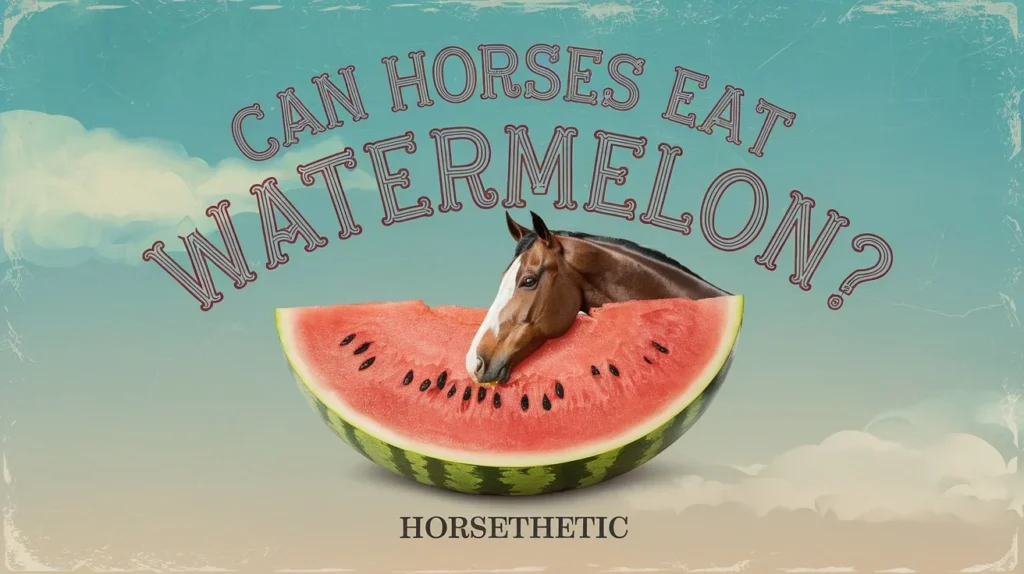On hot summer days, there’s nothing better than sharing a juicy snack with your equine friends.
Feeding small quantities of ripe watermelon can be a fun way to mix up their diet, but it’s essential to introduce it slowly and monitor how they react.
While the fruit itself is generally safe, certain parts like the seeds and excessive rinds can pose dental issues or lead to digestive discomfort. Horses with insulin-resistance conditions or hyperkalemic periodic paralysis should avoid overfeeding, as too much sugar or potassium can be harmful.
Nutritional Profile of Watermelons
Watermelons are one of the healthiest treats you can offer your horse—not just because they’re delicious but also because they’re packed with nutritional value. Since watermelons are 92% water, they are incredibly hydrating, making them a great snack, especially in hot weather.
Vitamins in Watermelon
The pink fleshy part is rich in
- Vitamin A,
- Vitamin B6
- Vitamin C
These vitamins help boost the immune system and overall horse health. These vitamins are essential for keeping the heart, muscles, and nerves functioning properly. Since horses eat strawberries as another healthy snack, they will likely love the sweet taste of watermelon while benefiting from its nutritional content.
Fibre & Rind Benefits
The rind isn’t just safe to eat; it’s loaded with fibre, which supports digestion.
Essential Minerals for Horses
For essential minerals, watermelon provides
- Calcium (7 mg) for strong bones, teeth, and hooves
- Iron (0.2 mg) for oxygen transport through haemoglobin and myoglobin
- Magnesium (10 mg) for hoof growth and laminitis prevention
- Potassium (112 mg) for heart, nerve, and muscle health
- Phosphorus (11 mg) for bone and dental health.
The Health Advantages of Including Watermelon in Your Horse’s Diet
Now you came to know about nutritions of watermelon so it is clear that Watermelon isn’t just a delicious treat—it’s packed with vitamins and minerals that can improve your horse’s health in many ways. Whether your horse enjoys the rind or the fleshy centre, this fibre-rich fruit provides essential nutrients while keeping them hydrated.
Enhanced Blood Circulation and Quicker Recovery
One of the biggest health benefits of feeding horses watermelon is the presence of citrulline, an organic compound and amino acid that converts into arginine inside the body. This process helps the body produce nitric oxide, which works to:
- Relax blood vessels and increase blood flow
- Ensure wounds heal quickly
- Minimize fatigue and keep your horse active
With improved circulation, your horse’s body recovers faster, keeping them energetic and healthy.
Improved Energy Levels and Reduced Fatigue
The vitamins and minerals listed above help boost your horse’s energy levels, making it easier for them to walk, graze, and exercise. Watermelons are a great addition to your horse’s diet as they provide:
- Vitamin A for better energy and eyesight
- Fibre to support digestion and stamina
- Antioxidants that may help fight cancer
Since horses love eating watermelon, it’s an easy way to keep their stamina up while offering a delicious treat.
Optimal Hydration and Electrolyte Regulation
If your horse is working in warm weather, simply drinking water may not be enough to keep them refreshed. Slipping them a slice of watermelon can:
- Keep them hydrated as watermelons are 92% water
- Satisfy their snack cravings while acting as a drink
- Provide a top-up of electrolytes lost due to sweating
After intense workouts, horses sweat and lose essential electrolytes, especially potassium. Since watermelon is rich in potassium, it serves as a natural electrolyte replenishment.
Can Overfeeding Watermelon Harm Your Horse?
However, the chances of seeds causing choke are incredibly small. Since treats should always be given in moderation, it’s best to feed your horse watermelon in controlled amounts to avoid any risks.
Watermelon Sugar Content
This juicy fruit is made up of about 90 percent water and contains 10 percent sugar, making it a refreshing treat. A cup of diced watermelon has around 10 grams of sugar and only 0.5 grams of fiber, so while it’s hydrating, too much can be a problem for a horse’s digestion. Horses naturally graze on pasture grass, which provides essential fiber, vitamins, and minerals without excessive sugar.
Unlike other fruits like grapes, which are commonly fed to horses, watermelon has a different nutritional profile. Even though a bucketful might seem tempting, it’s best to limit a serving to small portions.
A horse typically eats 25 percent of its day’s food in the form of roughage, consuming pounds of forage. Excessive sugar intake, especially from treats, can increase the risk of laminitis and colic. Instead of letting them overindulge, offering a few small pieces occasionally ensures they get the benefits of vitamins A, C, magnesium, and phosphorus without disrupting their diet.

Are there any Toxins in Watermelon?
Many horse owners wonder if it’s safe to feed their horses a juicy watermelon on a hot day. While this fruit is a tasty treat, there are a few things to keep in mind before offering a slice.
- The rind and seeds of a watermelon don’t contain any harmful toxins, but they can pose minor concerns. Seeds—especially if not roasted or removed—can present a tiny chance of choking, though most horses chew them without issue. If you’re worried, opt for seedless watermelons.
- The rind is technically edible and often eaten by humans in dishes like pickled watermelon rind, but for horses, it can be tough to chew and digest in large quantity. It’s best to feed it in small pieces.
- The outside of the rind can carry bacteria like E. coli or be sprayed with pesticides and herbicides. Always wash the entire melon with cool water and a scrub brush before cutting through the flesh with a knife. This prevents contamination from transferring inside.
Since watermelon is part of the cucumber family, its skin has a texture similar to a cucumber, which some horses may enjoy while others might find it too tough. It’s always good to introduce it gradually and see how your horse responds.
Curious About Feeding Watermelon to Your Horse? Here’s How to Do It Safely!
If you’ve ever wondered whether horses can enjoy watermelon, the answer is yes! But before offering this exotic snack, it’s important to understand how to introduce it properly. Not all horses react the same way, and some might be fussy eaters.
While most can successfully enjoy this fruit, a few may have sensitive digestive systems, especially young or infant horses. So, let’s break it down step by step.
The Right Way to Feed Watermelon to Your Horse
- Start Small: It’s recommended to begin with small portions to see if your horse enjoys it and can digest it well. A couple of slices should be enough for a first try.
- Choose the Right Size: Cut the watermelon into slices similar in size to a carrot stick. This makes it easier for your horse to chew and reduces the risk of choking.
- Separate the Rind: Some horses have no problem consuming the rinds, while others might struggle. If your horse isn’t used to it, try separating the fleshy centre from the rinds and see which part they prefer.
- Observe for Allergies: Though rare, some horses may show signs of an allergic reaction after eating watermelon. Watch for any unusual behavior after feeding and stop immediately if you notice anything off.
- Portion Control & Frequency: Since watermelon has a high water level, it should only be given occasionally as a treat. Older horses can usually handle larger servings, but don’t let it replace regular meal times.
Every horse is different, so it’s always a fun experiment to see how yours reacts. Whether they love or ignore it, you’ll know how to adjust their diet to keep them happy and healthy!
How Much Watermelon Can Horses Eat?
Avoid large portions or overfeeding, and always remove most seeds. Offering the rind in small quantities can be a fun reward, but the ripe part is easier to chew. Keep the amount controlled to curb any cravings without harm!
Everything in Moderation
As you know Horses can eat watermelon, but only occasionally and in small quantities to avoid gut issues. Since its sugars can lead to colic or other problems, it’s best to be careful with feeding. Avoid giving a large quantity at once, and always cut it into easy-to-chew pieces to prevent choking from improperly chewed food.
While some enjoy the rind, others might not digest it well. Never toss half-ripe melons from the garden or pasture, as they might cause stomach upset. Serve fresh chunks as a summertime treat, but remember—moderation is key!
FAQS
How much watermelon can you give a horse?
Horses can enjoy watermelon in moderation—a few slices as a treat. Overfeeding can lead to digestive issues, so always introduce new foods slowly and monitor their reaction.
Is there any fruit that horses can’t eat?
Yes, horses should avoid fruits like avocados, cherries (with pits), and tomatoes, as they contain toxins or pose choking hazards. Always remove seeds and pits before offering fruits.
Can horses eat the skin of a watermelon?
Yes, horses can eat watermelon rind, but it should be washed thoroughly to remove pesticides. Cut it into small pieces to prevent choking and make it easier to digest.
Is melon safe for horses?
Melons like cantaloupe and honeydew are safe for horses in small amounts. Remove the seeds and rind, and offer bite-sized pieces as a refreshing, hydrating treat.
Conclusion
Horses can safely eat watermelon as a refreshing treat, but only in moderation. Offering small portions helps prevent digestive issues, and removing most of the rind and seeds makes it easier to chew.
Since watermelon contains sugars, avoid overfeeding to keep their gut healthy. Whether you’re feeding it on a hot day or as an occasional reward, keeping the quantity controlled ensures your horse enjoys it without any problems

